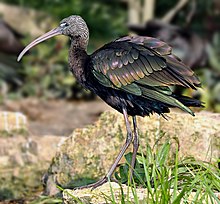ചെമ്പൻ അരിവാൾക്കൊക്കൻ
ചെമ്പൻ അരിവാൾക്കൊക്കന്[2] [3][4][5] ആംഗലത്തിലെ പേര് Glossy ibis എന്നാകുന്നു.Plegadis falcinellus എന്ന് ശാസ്ത്രീയ നാമവും ഉണ്ട്. ദേശാടന പക്ഷിയാണ്. 1995 ലാണ്ക്കെറാലാത്താണ് ഈ പക്ഷിയെ ദേശാടന പക്ഷിയായി അംഗീകരിച്ചത്. [6] ചെമ്പൻ ഐബിസ് എന്നും ഇതിനെ അറിയപ്പെടാറുണ്ട്.
| ചെമ്പൻ അരിവാൾക്കൊക്കൻ | |
|---|---|

| |
| Non-breeding plumage | |
| ശാസ്ത്രീയ വർഗ്ഗീകരണം | |
| കിങ്ഡം: | |
| Phylum: | |
| Class: | |
| Order: | |
| Family: | |
| Genus: | |
| Species: | P. falcinellus
|
| Binomial name | |
| Plegadis falcinellus Linnaeus, 1766
| |
വിതരണം
തിരുത്തുകയൂറോപ്പ്, ഏഷ്യ, ആഫ്രിക്ക, ആസ്ട്രേലിയ, അറ്റ്ലാന്റിക് സമുദ്രം, കറീബിയൻ എന്നിവിടങ്ങളിലെ ചൂടുള്ള ഭാഗങ്ങളിൽ പപ്രജനനം നടത്തുന്നു. [7]
തടാക, നദിക്കരകളിലുള്ള ചതുകളാണ് കൂടുതൽ ഇഷ്ടം. ജലസേചനമുള്ള കൃഷിയിടങ്ങളിൽ കാണാറുണ്ട്. ഇര തേടുന്ന സ്ഥലത്തിനു അകലെയുള്ള ഉയരമുള്ള മരങ്ങളിലേക്ക് വൈകീട്ട് ചേക്കേറുന്നു.
തീറ്റ
തിരുത്തുകകാലത്തിനനുസരിച്ച് ഭക്ഷണത്തിൽ മാറ്റമുണ്ട്. ലാർവകൾ, പ്രാണികൾ, തുമ്പികൾ, പുൽച്ചാടികൾ, അട്ടകൾ, ഒച്ചുകൾ, കക്കകൾ, ഞണ്ടുകൾ, പല്ലികൾ, ചെറിയ പക്ഷികൾ എന്നിവയും ഭക്ഷണത്തിൽ പെടുന്നു. .[1]
രൂപ വിവരണം
തിരുത്തുകഇടത്തരം ഐബിസാണ്. 48-66 സെ.മീ നീളം, 80-105 സെ.മീ. ചിറകു വിരിപ്പ്.[8][9] [9] 485-970 ഗ്രാം തൂക്കം. [9] പ്രജനന കാലമല്ലാത്തപ്പോൾ മങ്ങിയ നിറം. ഇരുണ്ട മുഖ ചർമ്മം, മുകളിലും താഴേയുംനീല-ചാര നിറത്തിലുള്ള അതിര്. .ചുവപ്പു-തവിട്ടു നിറമുള്ള കാലുകൾ.തവിട്ടു നിറത്തിലുള്ള കൊക്ക് . കഴുത്ത് നീട്ടിപ്പിടിച്ചാണ് പറക്കുന്നത്. കൂട്ടമായി പറക്കുമ്പോൾ V ആകൃതിയുണ്ടാക്കുന്നു. .
പ്രജനനം
തിരുത്തുകചെമ്പൻ ഐബിസ് ശുദ്ധ ജലത്തിലൊ ഉപ്പ് കലർന്ന വെള്ളത്തിലൊ ഉയർന്നു നിൽക്കുന്ന ചെടികളിലൊ കുറ്റിച്ചെടികളിലൊ കൂട് വെയ്ക്കുന്നു. വെളത്തിനു് 1 മീ. ഉയരത്തിൽ പരന്ന കൂട് ഉണ്ടാക്കുന്നു.
മൂന്നൊ നാലൊ മുട്ടകൾ ഇടുന്നു. 20-23 ദിവസം കൊണ്ട് വിരിഞ്ഞിറങ്ങുന്ന കുഞ്ഞുങ്ങൾ 25-28 ദിവസംകൊണ്ട് പറക്കാറാകുന്നു.[6]
അവലംബം
തിരുത്തുക- ↑ 1.0 1.1 "Plegadis falcinellus". IUCN Red List of Threatened Species. Version 2014.3. International Union for Conservation of Nature. 2012. Retrieved 29 November 2014.
{{cite web}}: Cite has empty unknown parameter:|last-author-amp=(help); Invalid|ref=harv(help); Unknown parameter|authors=ignored (help) - ↑ J, Praveen (17 November 2015). "A checklist of birds of Kerala, India". Journal of Threatened Taxa. 7 (13): 7983–8009. doi:10.11609/JoTT.2001.7.13.7983-8009.
- ↑ "eBird India- Kerala". eBird.org. Cornell Lab of Ornithology. Retrieved 24 സെപ്റ്റംബർ 2017.
- ↑ കെ.കെ., നീലകണ്ഠൻ (2017). കേരളത്തിലെ പക്ഷികൾ (5 ed.). കേരള സാഹിത്യ അക്കാദമി. p. 490. ISBN 978-81-7690-251-9.
{{cite book}}:|access-date=requires|url=(help) - ↑ Grimmett, Richard; Inskipp, Tim; P.O., Nameer (2007). Birds of Southern India [Thekke Indiayile Pakshikal (Malayalam version)]. Mumbai: BNHS.
{{cite book}}:|access-date=requires|url=(help); no-break space character in|title=at position 52 (help) - ↑ 6.0 6.1 പ്രവീൺ.ജെ., ചെമ്പൻ ഐബിസ്, കൂട് മാസിക, മാർച്ച് 2016
- ↑ Olson, S.L.; James, H.F.; Meister, C.A. (1981). "Winter field notes and specimen weights of Cayman Island birds". Bulletin of the British Ornithologists' Club. 101: 339–346. ISSN 0007-1595.
Wetmore observed an adult and an immature with herons in the West Bay district, 3 February 1972. Johnston et al. (1971) list but one sighting on GC (Grand Cayman) and 2 on CB (Cayman Brac).
- ↑ "Glossy ibis videos, photos and facts – Plegadis falcinellus". ARKive. Archived from the original on 2013-03-27. Retrieved 5 March 2013.
{{cite web}}: External link in|website= - ↑ 9.0 9.1 9.2 Hancock, James A.; Kushan, James A.; Kahl, M. Philip (1992). Storks, Ibises, and Spoonbills of the World. Academic Press. ISBN 978-0-12-322730-0.
കൂടുതൽ വായനക്ക്
തിരുത്തുക- Cramp, Stanley; Perrins, C.M.; Brooks, Duncan J., eds. (1994). Handbook of the Birds of Europe, the Middle East, and North Africa: The Birds of the Western Palearctic. Oxford University Press. ISBN 978-0198546795.
- Field Guide to the Birds of North America (4th ed.). National Geographic Society. 1987.
പുറത്തേക്കുള്ള കണ്ണികൾ
തിരുത്തുക- BirdLife species factsheet for Plegadis falcinellus
- Glossy Ibis - The Atlas of Southern African Birds
- Glossy Ibis Species Account – Cornell Lab of Ornithology
- Glossy Ibis videos, photos, and sounds at the Internet Bird Collection
- Glossy Ibis Plegadis falcinellus Archived 2006-11-29 at the Wayback Machine. - eNature.com
- Field guide photo page on Flickr
- ചെമ്പൻ അരിവാൾക്കൊക്കൻ photo gallery at VIREO (Drexel University)
